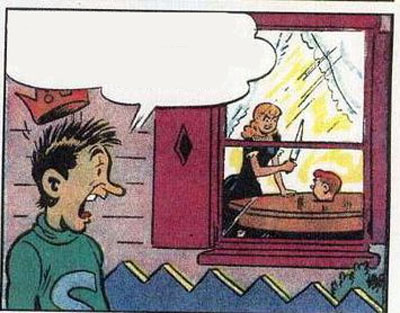
(hat tip to Jaime Weinman for this one)
13
Feb

(hat tip to Jaime Weinman for this one)
12
Feb
So a few years ago I pointed out that Mortal Kombat vs. DC Universe was a terrible and stupid idea, and that if you are going to have a DC fighting game, then it should be a game where the characters are all super-strong and punch each other through buildings and where everything explodes when you throw it at people, and it appears that DC paid attention and then, because we are talking about DC Comics here, did it, but went and fucked the bag.
Because come on. A game where you have Harley Quinn and the Joker fighting Superman is a stupid game. A game where Batman, who is not even in Bat-Hyper-Power-Armor, can punch Doomsday through a building is a stupid game. A game where DC heroes are trying to murder the other guys (seriously, look at Superman and his heat vision and tell me he is not in killing-psycho-mode) is a stupid game. Basically, DC should have run the hell away from the Mortal Kombat people, but instead decided that what they really needed to do was embrace the terrible Mortal Kombat people and not incidentally run with all of the worst design ideas invented in Arkham City (“hey, let’s take Arkham Asylum and, you know, basically make it worse in every possible way”), except even more than that. As I have said before: as a general rule, DC Comics and good video games go together like Santa Claus and conquering the Martians.
(Man, imagine how much more pissed I might be if I still bothered to read DC comic books. Which I don’t. I don’t even bother pirating them, because DC comics are so unreadable these days that they are not worth “free.”)
11
Feb
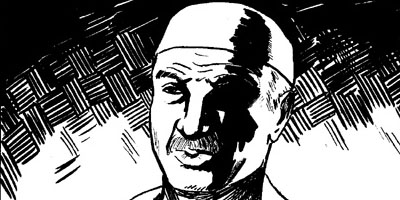
As always, you can also go to the dedicated Al’Rashad site.
5
Feb
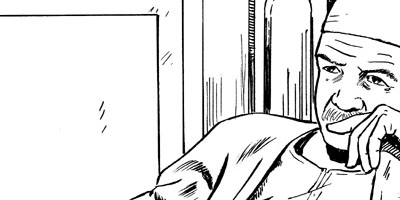
As always, you can also go to the dedicated Al’Rashad site.
I’m in court tomorrow morning (it is my job, after all) and that combined with a couple other things means Al’Rashad won’t get published Monday morning as per usual. We will get it up as soon as possible! (I think this is only the second time we’ve been late, which is not bad for a comic that has been going for… holy shit, over two and a half years? Man, the time gets away from you, don’t it.
3
Feb
Way back at the beginning of my time on this site, I waxed rhapsodic about ‘The Elongated Man’, but I think it’s been long enough that it’s worth repeating: The old ‘Elongated Man’ backup strips in the Silver Age ‘Flash’ comic, which have been collected in DC’s ‘Showcase Presents’ series of big black-and-white trade paperbacks, is absolutely brilliant.
For those of you unfamiliar with the “classic” version of the character, The Elongated Man was a contortionist who discovered a secret plant extract called “gingold” that amplified his natural abilities to Plastic Man-level powers, and proceeded to become a super-hero. At first it seemed like his primary goal was to show off how much better he was than Barry Allen, but after a few stories, he settled into a nice guy, revealed his secret identity (which, since this was the Silver Age, did not result in his gruesome death at the hands of a well-organized band of ruthless supervillains) and married Sue Dearbon, a rich heiress. The two of them settled into a regular back-up feature in which they traveled the world, bumping into strange and unusual mysteries that they solved a la Agatha Christie’s Tommy and Tuppence Beresford, or Dashiell Hammett’s Nick and Nora Charles.
The mysteries are not “fair play” mysteries, but they are clever and they always have inventive hooks. One story, for example, opens with them going to a sold-out play…only to find out that they’re the only people in the audience, and yet the sound of laughter and applause rings through the room and the actors play as though to a whole crowd. (The solution to that one involves an eccentric billionaire, but I won’t divulge more.) Ralph and Sue are both clever and charming, and clearly in love, and they use their wits together to solve the mystery and find the culprits.
At which point a fistfight usually ensues, because this is a superhero comic, and it’s here that you understand why Carmine Infantino is such an amazing and legendary artist. His solid draftsmanship makes every scene look good, but his pencils in the fight sequences really make you understand how a character with super-stretching powers can be less of a cerebral thinker or a whacky comic-relief character and more of a bad-ass one-man whirlwind of flying fists and feet. Ralph uses his stretching abilities to launch villains into walls, punches six guys at once, or twists like an unwinding rubber band to literally hit everyone in the room at once. I never thought of Ralph Dibny as a tough guy, but after reading this I’m seriously convinced hat he could take Batman in a fight.
Every story is charming, funny, and casual-reader friendly. Each mystery is fun to read, and while it’s not a “fair play” mystery (one in which you could reasonably deduce the ending from the clues provided by the author), it isn’t one that out-and-out cheats, either. The collection is 500 pages of pure fun, and now that all of the mistakes that made the character unworkable post ‘Identity Crisis’ have been undone by the reboot, DC could do worse than revisit the character…assuming they did so in the same spirit as the original, of course. Which, in the interests of staying positive as I always try to do for these entries, I will not discuss here.
1
Feb
As I have said previously, I don’t read PvP regularly any more, mostly because I don’t find it particularly entertaining, and I’ve talked about that before. Other people do, and that’s fine. We all like different things. But this week somebody emailed me and said “you have to check out the current guest story by Dylan Meconis because it will make you flip your shit“, and this person generally knows what makes me flip my shit, so I said “oh, all right” and went and read it. And my shit, while not quite flipped, was certainly bestirred.
To be fair to Meconis: the art is generally good and she clearly knows how to construct a strip properly (and so many people don’t). But the story elements harp on one of my major pet peeves that has emerged out of nerddom over the last decade or so.
Quick summary of the plot: There are two characters named Marcie and Francis, who recently got married. Marcie is a relatively normal person who likes a lot of “nerd things.” Francis – as anybody who reads PvP knows – is one of the worst examples of a stupidly common trope in nerdesque literature, e.g. the ubernerd who is basically an amoral sociopath but who periodically “redeems” himself by recognizing that he is a dickhole and making a grand gesture to apologize. (Every nerd comic strip seems to have at least one of these. Some of them have multiples, because nerd comic strip makers seem to think that these people are, in some way, quixotically admirable. SPOILER: They never are.)
Anyway, prior to getting married, Marcie took off elsewhere and was single for a while, and the premise of this particular story is that during that time she dated a dude named Arjun Khan (who from the moment of his introduction telegraphs the eventual “KHAAAAN” joke, of course) who was an architecture grad student there. It rapidly becomes clear that Arjun is a cool guy in all respects: he’s polite, friendly, good-looking, charming, smart, lots of other good things. His one flaw is that he does not know the difference between Star Wars and Star Trek: he is not a nerd!
(I just want to pause the plot here for a second. Putting aside, for a second, the fact that anybody who makes it to grad school is going to be at least slightly nerdy in some way – it doesn’t happen otherwise, folks – is anybody else really sick of the “oh he can’t tell the difference between Star Wars and Star Trek” shorthand for “mainstream”? Fucking everybody knows the difference between Star Wars and Star Trek. My sixty-five-year-old mother, who does not follow science fiction in the least – she really likes Downton Abbey, though – knows that Star Wars is lightsabers and Jedi and Darth Vader and the Rebel Alliance, and Star Trek is Kirk and Spock and the Enterprise and the Prime Directive. Which is to say: this bit of storytelling shorthand is stupid and needs to go away forever.)
Francis, because he is a dickhole, flies into a jealous rage, and then he makes his Grand Gesture, which is to play Skyrim for so long that he can get all of the cheese wheels in the game together. Putting aside the fact that a video gamer playing a video game for a long time is a pretty weak-ass Grand Gesture, I really want to comment on Francis’ sullen, angry-looking “will you just look at the shit I do for you” expression here, because it is fucking creepy. If somebody glared at me like that while they were supposedly apologizing, I would not be inclined to take their apology seriously. I am just saying. But anyway, Marcie breaks down crying because somehow this is now her fault for not telling Francis about her ex-boyfriend when she knew perfectly well he would freak out like a stupid asshole.
Anyway, the two of them make up, essentially, and Francis asks Marcie why she picked him over Arjun, who is so clearly better a person than Francis it is not even funny, and her explanation is that Arjun is not a nerd – he doesn’t like comics or video games or going to cons. And this is the part that drives me nuts, because this isn’t just questionable story writing – this is something I hear people say in real life all the time, especially from nerds, and it’s always silly.
Look, I have had my share of relationships. Some of them liked some of the weird stuff I liked. Some of them did not. (None of them liked professional wrestling, despite my pointing out that it was homoerotic as all hell, honestly, and come on, babe, you love slash fiction… but I digress.) Certainly none of them liked all of the stuff I liked, which is fine, because that is called “being an adult” and recognizing that while shared interests can certainly strengthen a relationship, they are arguably the least important part of one. Being considerate of your partner’s emotional needs, for example. Helping them with their daily logistics. Being something that generally makes their life better rather than being an emotional trial. Or, and I am just throwing this out here, not being a massive dickhole all the goddamn time.
“Liking the same stuff” is so far down the list as to be negligible, especially when “showing interest when your partner tells you stuff they are excited about” will do just as well ninety-five percent of the time (and if you genuinely like the person, then it’s never hard to be actually interested because they’re interested, even if afterwards you won’t bother following up with your own independent research on the topic) and when, if we’re being honest, “liking the same stuff” can be as basic as “sports,” “movies,” “eating out” or “doin’ it.” But Jebus, telling this to nerds is only slightly more difficult than… I am running dry on analogies here, so you can just pretend I mentioned Doctor Who or something, but my general point is that “nerd subculture” – which, really, is a thing that should not exist, because there is no logical reason that people who like comic books should also like video games except for the fact that they are intensely marketed to the same demographics – places too high a priority on its gewgaws of nerdformation.
This is, when you get down to it, another facet of the mindset that created the “fake geek girl” brouhaha last year – the belief that somehow, knowing what THAC0 is or being able to hum the Doomy Doom song from Invader Zim is in and of itself precious, rather than the fun-but-meaningless-crap that it clearly is. It’s all about the same gatekeeper mentality, that conflation of “nerd identity” to something akin to race (which, while also an entirely social construct, at least provides clear visual identifiers when the people being identified aren’t cosplaying), but in the PVP story, Meconis has actually gender-reversed it – which is, I suppose, sort of a blow for geek girls? Except it means that geek girls have to settle for horrible Francises rather than decent and good Arjuns, so actually never mind, that’s not a blow for geek girls at all when you think about it. Someone more talented than me should write a sociological essay or something about that.
(And, of course, the denouement to the story shows us that Arjun, all along, was willing to try and learn about Marcie’s interests anyway, because even as he is being cast as a potential future villain, he’s still basically a decent guy. Also, the gag line in that particular strip is very good.)
EDIT TO ADD: Discussion in the comments is going astray from what I was trying to talk about as people defend the necessity of shared interests in a relationship – and yes, shared interests are important, of course, but that wasn’t my point so I’m going to expound a little more.
The issue here is, as I said, about the gatekeeper mentality that envelops nerdity. It’s the nerds-as-tribe dynamic (and, in another aside, when nerd parents do their best to get their kids into the nerd stuff they like, that’s part of it too). Shared interests are important, yes, but your average nerd presumably also likes things that are not-nerdy! You can share those interests, which is my point: in the strips, Arjun and Marcie clearly have lots of stuff in common that they like. It’s just not the nerd stuff, and the statement being made is that the nerd stuff is more important somehow. Which: everybody values their own obsessions differently, of course. But choosing borderline-sociopath over decent-human-being because of those obsessions – because the decent human being, while decent, is not one of us per se – has all sorts of wrongness attached to it. And that’s what bugs me about the strip and the larger thought process it represents – because even if you really, really like playing XBox, we are all more than our individual Xboxen.
29
Jan
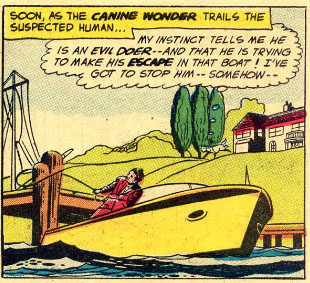
A thief is getting away in a high-speed motorboat! Whatever will we do to catch him?
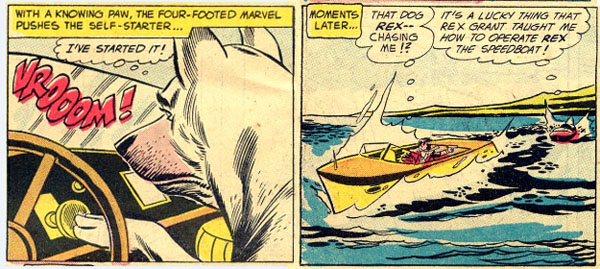
What, indeed. For there exists no skill in any human living that cannot be instantly acquired and bested by Rex the motherfucking Wonder Dog.
28
Jan
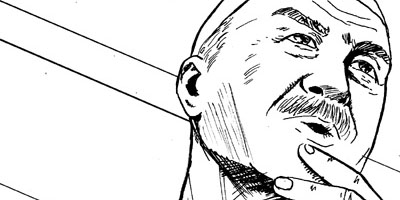
As always, you can also go to the dedicated Al’Rashad site.
21
Jan
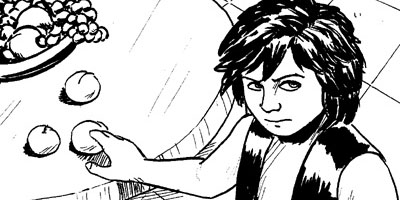
As always, you can also go to the dedicated Al’Rashad site.
14
Jan
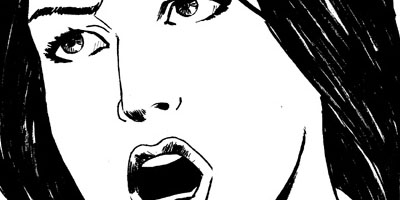
As always, you can also go to the dedicated Al’Rashad site.
12
Jan
When I said that to my wife a bit ago, she looked at me and said, “I have no idea what you mean by that.” I’m kind of assuming you feel the same way, so I’ll explain.
A traditional ‘alternate universe’ story, which is something that just about every sci-fi/fantasy series gets to from time to time, is like pornography in that it’s really just the same thing each time with very little variation. Each AU storyline purports to focus on a single point of divergence that has sent history down a different path…but the differences are never so great as to preclude instant audience identification. (For example, in the Star Trek: The Next Generation episode ‘Yesterday’s Enterprise”, twenty years of war with the Klingon Empire hasn’t resulted in any advances in technology beyond the Galaxy class starship, the Enterprise hasn’t been destroyed and replaced by the E or F, and all of the bridge crew have not only survived but have wound up in the exact same command positions on the exact same ship. Likewise, Giles is still assigned to the Hellmouth and despite the subtext of many episodes involving the idea that what separates Buffy from other Slayers who’ve died young is her friendships and connections with the everyday world, the only sign that Buffy is any less skilled as a Slayer is the little scar on her lip.)
The “twists” to this reality are designed, like porn, to provide simple and visceral thrills. They are less intended as logical consequence of any particular point of divergence as they are to give the audience the specific excitement of breaking well-established narrative rules. The premature death of Charles Xavier, for example, doesn’t lead to the dystopia ruled by Apocalypse because Charles Xavier did anything in particular, it leads to the dystopia ruled by Apocalypse because it’s the only chance that Marvel has to show a world where the bad guys won and the heroes are a desperate resistance movement. In the much later “Here Comes Tomorrow” storyline, Beast isn’t a villain because it’s a logical extension of Scott’s retirement from the team; he’s a villain because showing a fan favorite hero as the villain is a staple of alternate universe stories. (Another common trope is best exemplified in the ‘Magik’ series, where the cute and winsome Shadowcat is shown, in the alternate dimension of Limbo, as being a hardened warrior. The series also shows charming and friendly Nightcrawler as a lecherous villain…basically, you can chalk up 95% of alternate universe stories to the combinations of “set in a dystopian reality”, “well-liked hero is a villain”, “infamous villain is a good guy”, and “comic relief/peril monkey character is a total bad-ass”.)
And, like pornography, alternative universe stories have their own version of the “money shot”. If you accept the idea that the breaking of series narrative conventions in an AU story is the sci-fi/fantasy series equivalent of the sex in porn (and roughly the same amount of time is devoted in AU stories to showing how different and unexpected the alternative timeline is as is devoted to the sex in a porn movie), then the natural “climax” is the ultimate breaking of narrative convention, the death of characters who normally are given a protected status by their role in the story. Buffy is always safe in the Buffyverse (and possibly the only person who is)…so therefore, she has to die at the end of ‘The Wish’. ‘Days of Future Past’ has to end with a bloodbath, because it’s the only time Chris Claremont can get away with incinerating Wolverine, Storm, Colossus and Magneto in a single issue.
Does this mean that alternate universe stories are without merit? No. Like porn, there are wide variations in quality. (‘Days of Future Past’ would be qualified as “erotica” in this analogy, for example.) But it is worth remembering that stories like these always start out with a huge advantage in fan’s affections because that’s really all they’re intended to do. They are stories made to give long-term followers of the series “fangasms”, no more and no less.
8
Jan
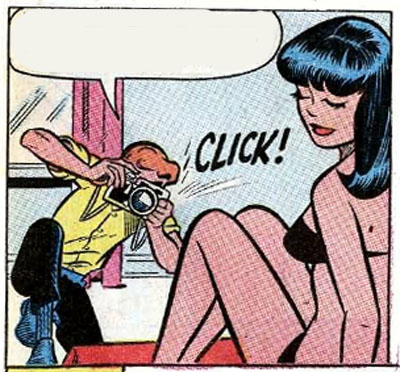
7
Jan
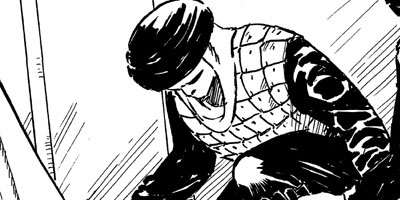
And that is how we wrap up issue five of the comic.
As always, you can also go to the dedicated Al’Rashad site.
5
Jan
I will freely admit, it has been a long, long time since John Byrne has been the kind of potent creative force he was back in the late 70s/early 80s. I don’t know how much of that is him being out of step with current comics trends, and how much of it is him starting to believe in his own myth to the point that he can’t accept constructive criticism anymore, but it has been a long time since he was anything other than a punchline. Which is why I feel like it’s worth mentioning just how good his Fantastic Four run really was.
At the time, the series was in something of a doldrums; Marv Wolfman’s run, while not actually bad, never managed to really strike many sparks. Byrne’s principal contribution was to revitalize the series by bringing back its classic Lee/Kirby foes like Diablo, Annihilus, Galactus and Doctor Doom, while finding ways to view them through a new light by concentrating on them as characters in their own right. Doom stopped being merely a snarling would-be worldbeater and became a complex, nuanced character with his own goals and code of warped ethics; one terrifyingly powerful storyline even suggested that Doom might have a point by showing that a Latveria without Doom was actually worse off than one he ruled. Annihilus was taken back to his roots as a raving paranoid and a devastating force of nature, and Galactus was re-envisioned as a cosmic entity beyond human understanding.
All this was combined with a lot of new material, too. Byrne’s Doctor Who-inspired exploration of the Negative Zone contained some wonderful self-contained, continuity-free stories, and he also had a strong run of early sci-fi stories like “The Man With the Power” which were conceptually very fine. In a modern, story-arc heavy world, we wouldn’t see something like these, but they were perfect for their era.
And he also did a great job of exploring the main characters. Susan endured a tragic miscarriage, and went through a lot of personal growth that led to her becoming the Invisible Woman. Johnny grew up in a lot of meaningful ways, ultimately turning into a responsible adult with a mature relationship, ready for marriage. And most controversially, the woman he was dating and ready to be married to (the wedding took place a few issues after Byrne left the title) was Ben’s old girlfriend, Alicia. Byrne’s treatment of Ben and Alicia’s relationship was both startlingly mature and bittersweet, and also a perfect outgrowth of what had come before. Ben constantly struggled with the question of whether he should end their relationship for her own sake, and finding out that she’d made the decision for him was part of a personal journey for Ben that really culminated a lot of the long-simmering tensions to the character. All that, while making Reed a likeable and well-drawn genius and quietly demonstrating his burdens as the leader of the FF and the steel beneath his “genial egghead” nature. (The scene where he tells Doc Ock that he knows he won’t have to personally escort him back to jail, because he’d be in a very bad mood if he had to chase him down, is startlingly effective.)
On the whole, I’d say this was one of the three best runs in FF history, and one I’m proud to own in its entirety. It’s been a long time since either Byrne or the FF was this good, but it’s worth savoring the whole thing.
"[O]ne of the funniest bloggers on the planet... I only wish he updated more."
-- Popcrunch.com
"By MightyGodKing, we mean sexiest blog in western civilization."
-- Jenn
